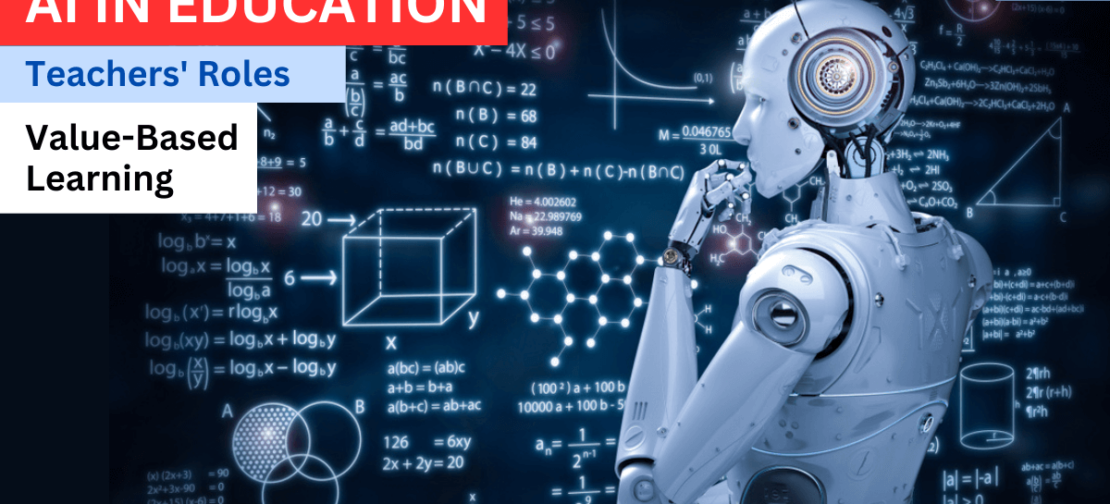
- Home
- About
- Knowledge Center
- Legislative Landscape
- Resources
- #TOGETHERFORBHARA
To recognize and thank teachers for their contributions to students and ultimately to overall society, October 5 has been celebrated as World Teachers’ Day since 1994. Through the process of socialization, teachers play a crucial role in society because they prepare the next generations for their roles and responsibilities, foster aspirations, push the limits of human potential, and transform lives. It is teachers’ responsibility to nurture, educate, and develop the students’ overall personalities so they can contribute to society. However, compared to earlier times, teachers’ role in the classroom is changing in this rapidly evolving landscape of education due to the integration of Artificial Intelligence (AI). In this blog, we discuss the relationship between AI, the changing role of teachers, and the need for high-quality, value-based education on the occasion of World Teachers’ Day.
AI in Education: Revolutionizing Learning

Image: An AI-powered robot is teaching in a classroom (representative image).
The way students learn has been transformed by Artificial Intelligence. AI-powered personalized learning platforms like To Teach, TutorAI, Unschooler, Adaptiv Academy, etc. can adapt to individual learning styles and paces to deliver a customized educational experience. It improves the effectiveness and efficiency of education in a variety of ways, from smart content recommendations to adaptive assessments. AI algorithms evaluate students’ performance and modify the curriculum to meet their unique needs. This promotes an inclusive learning environment by ensuring that no one is left behind. Additionally, these AI-driven systems give quick feedback and support, simulating a one-on-one tutoring environment. This not only helps struggling students but also challenges high-achievers. Thus, AI systems like ChatGPT have enormous potential to change the way that education is given. The opening of India’s first AI school in Kerala is evidence of this development.
However, AI is a must for enhancing the educational process rather than replacing teachers, who are absolutely essential. A complete and effective education can be ensured by combining technology and conventional teaching techniques, underscoring the ongoing importance of interpersonal connection in the learning process. So, let us see the changing role of teachers in an educational environment enriched by AI.
The Evolving Role of Teachers

Photo: Distance learning (source: STEMpedia).
Teachers become mentors, advisers, and learning facilitators rather than being replaced. They can follow students’ progress, discover patterns in their learning, and deliver tailored interventions by utilizing AI techniques. Teachers are also crucial in developing emotional intelligence, teamwork, and effective communication, areas where AI is still lacking. Therefore, to be relevant and serve the purpose of true education, teachers need to concentrate on encouraging students’ critical thinking, problem-solving, and creative skills, in addition to value-based quality education, which is crucial for success in the 21st century.
Value-Based Quality Education: The Moral Compass

Photo: A teacher is teaching with compassion, love, and care
“One looks back with appreciation to the brilliant teachers, but with gratitude to those who touched our human feelings. The curriculum is so much necessary raw material, but warmth is a vital element for the growing plant, and for the soul of the child.” – Carl Jung
In the age of AI, value-based education is more critical than ever. AI is a double-edged sword. It depends on the intentions of the user. So, instilling ethical principles, empathy, and social responsibility in students should be the priority of a good teacher. It can prepare students to be responsible global citizens who understand the impact of their actions on a broader scale. Therefore, by considering the huge implications of technology on society, teachers need to develop universal human values among their students so that they will have the ability to judge what is right and wrong and will act accordingly.
Fostering Critical Thinking: A Bridge between AI and Human Wisdom
Martin Luther King Jr. famously said, “The function of education is to teach one to think intensively and to think critically. Intelligence plus character – that is the goal of true education.” In the twenty-first century, critical thinking is the foundation of education. It serves as a link between the capabilities of AI and human wisdom. AI is capable of processing enormous volumes of data, but only the human mind can contextualize, question, and apply knowledge in meaningful and constructive ways. Therefore, in the era of information overload, critical thinking skills are crucial because they enable students to examine information, read between the lines, identify reliable sources, and make judgments. It also encourages creative problem-solving, enabling students to tackle complex challenges that AI alone might struggle to address.
Conclusion
While AI presents an invaluable tool, it is the human touch that imparts wisdom, empathy, and the moral compass needed to navigate an ever-evolving future. As we forge ahead, let us remember that education goes beyond algorithms and code; it is a deeply human pursuit!
